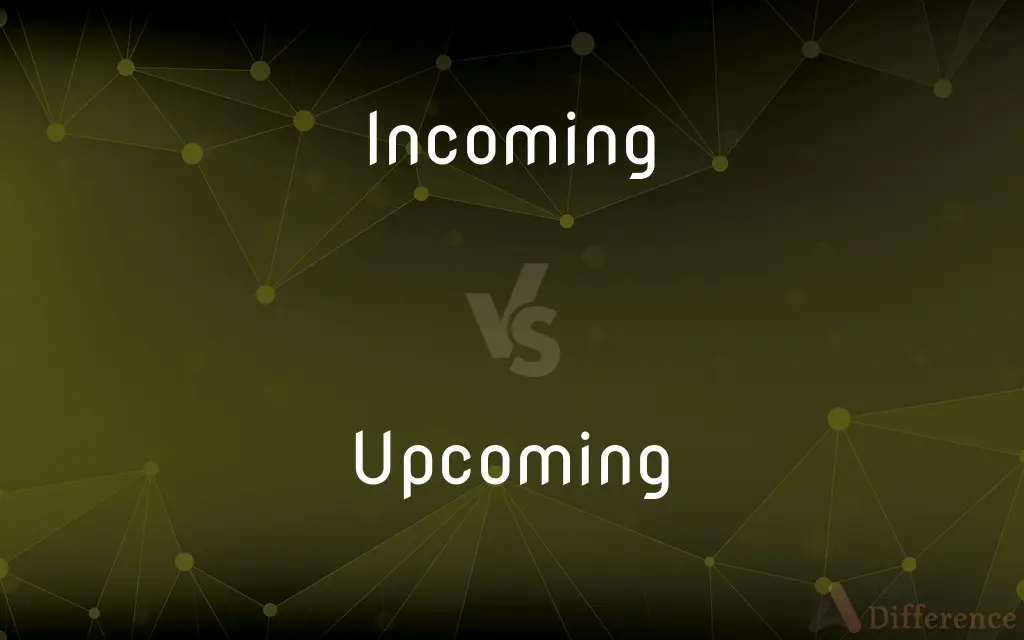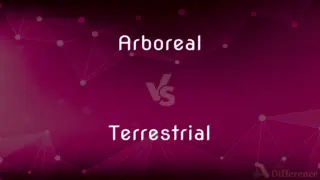Incoming vs. Upcoming — What's the Difference?
Edited by Tayyaba Rehman — By Urooj Arif — Updated on March 18, 2024
Incoming refers to something approaching or about to happen, focusing on the arrival aspect, while upcoming emphasizes something that is scheduled to occur soon, highlighting the anticipation.

Difference Between Incoming and Upcoming
Table of Contents
ADVERTISEMENT
Key Differences
Incoming often relates to things or events that are on their way or in the process of arriving, such as incoming flights or messages. It implies a movement towards a point. Upcoming, on the other hand, is used for events or occasions that are planned or expected to happen in the near future, like upcoming meetings or releases, indicating a sense of anticipation or preparation.
Incoming is typically associated with things that are incoming from another location or context, suggesting a transition or movement. For instance, incoming calls are those being received from another phone. Upcoming is more static, referring to events or items on a schedule or calendar, without implying movement, such as an upcoming holiday or product launch.
The term incoming can also carry a sense of immediacy or urgency, as it often refers to something currently in the process of arriving. This can apply to both physical and abstract contexts, such as incoming weather fronts or data. Upcoming, whereas, denotes a future occurrence that, while imminent, may not have the same immediate impact or require immediate attention.
Incoming has a broader application and can be used in various contexts, from military (incoming fire) to personal communication (incoming messages). It emphasizes the point of origin and the act of coming in. Upcoming is more narrowly focused on events, appointments, or releases, highlighting their scheduled nature and the forward-looking perspective.
While incoming can suggest an element of surprise or lack of control over what is arriving, upcoming carries a planned or expected connotation, suggesting that there is preparation involved for what is to come. This distinction can affect how individuals or organizations respond to incoming versus upcoming events or information.
ADVERTISEMENT
Comparison Chart
Definition
Referring to something arriving or approaching.
Referring to something that is scheduled to occur soon.
Context
More immediate, with a focus on the arrival aspect.
More anticipatory, focusing on future occurrences.
Movement
Implies movement towards a point.
Indicates a scheduled or planned event, without implying physical movement.
Urgency
Often conveys a sense of immediacy or urgency.
Suggests a planned or anticipated event, not necessarily immediate.
Application
Broad, can apply to physical, abstract, or metaphorical arrivals.
More focused on events, appointments, or releases.
Compare with Definitions
Incoming
Approaching from elsewhere.
The radar detected an incoming storm.
Upcoming
Scheduled to happen in the near future.
The upcoming conference has been widely advertised.
Incoming
Entering into a particular role or position.
The incoming CEO met with the board yesterday.
Upcoming
Approaching or soon to be realized.
The artist announced his upcoming album release.
Incoming
Being received, as in communications or data.
The server is processing incoming requests.
Upcoming
Imminent or forthcoming.
Upcoming software updates will include new features.
Incoming
About to arrive or enter a place.
The hotel prepared for the incoming guests.
Upcoming
Next in a sequence or schedule.
Please review the agenda for the upcoming meetings.
Incoming
Newly elected or appointed, not yet in office.
The incoming president outlined her policies.
Upcoming
Being in the process of preparation or finalization.
The team discussed the upcoming marketing campaign.
Incoming
Coming in or about to come in
Incoming trains.
Incoming mail.
Incoming mortar fire.
Upcoming
Upcoming (formerly Upcoming.org) is a social event calendar website that launched in 2003, founded by Andy Baio.
Incoming
About to assume an office or position
The incoming governor.
Upcoming
Occurring soon; forthcoming.
Incoming
The act of coming in; arrival.
Upcoming
Happening or appearing in the relatively near future.
We are ready for whatever is upcoming.
The Federal budget lays out government spending for the upcoming budget year.
Incoming
Often incomings Income; revenue.
Upcoming
Eggcorn of up-and-coming
Incoming
Coming (or about to come) in; arriving.
Incoming tides cause a tidal bore in many rivers.
Upcoming
Pertaining to to upcome
Incoming
Succeeding to an office.
The incoming prime minister gave a press conference.
Upcoming
The act of coming up.
Incoming
(countable) The act of coming in; arrival.
Upcoming
Comeuppance; deserts
Incoming
Fire directed at oneself.
Upcoming
The activity of to upcome
Incoming
(military) A warning that something is coming towards the addressee, especially enemy artillery fire.
Upcoming
Present participle of upcome
Incoming
Coming in; accruing.
A full incoming profit on the product of his labor.
Upcoming
Of the relatively near future;
The approaching election
This coming Thursday
The forthcoming holidays
The upcoming spring fashions
Incoming
Coming in, succeeding, or following, as occupant or possessor; as, in incoming tenant.
Incoming
The act of coming in; arrival.
The incomings and outgoings of the trains.
Incoming
Income; gain.
Many incomings are subject to great fluctuations.
Incoming
The act of entering;
She made a grand entrance
Incoming
Coming in or succeeding or of the future;
Incoming class
Incoming mail
The incoming president
Common Curiosities
What does upcoming mean?
Upcoming denotes something that is planned or expected to happen soon.
Can incoming be used for events?
Yes, incoming can be used for events, especially if they are imminent or approaching.
What does incoming mean?
Incoming refers to something approaching, arriving, or being received.
How do incoming and upcoming differ in terms of urgency?
Incoming often conveys a sense of immediacy, whereas upcoming indicates a future occurrence without immediate urgency.
Is upcoming only used for events?
While commonly associated with events, upcoming can also refer to anything scheduled or anticipated, like product releases.
How does the context change the use of incoming and upcoming?
Context determines whether the focus is on the arrival or approach of something (incoming) or its scheduled occurrence (upcoming).
Can a meeting be described as incoming?
Typically, a meeting would be described as upcoming, but if it's starting imminently, it might be referred to as incoming.
Is an incoming message the same as an upcoming message?
No, an incoming message is one that is being received now, while an upcoming message would imply a scheduled or planned message to be sent later.
Is upcoming more optimistic than incoming?
The connotation can vary; upcoming is often neutral or positive, focusing on anticipation, while incoming can be neutral, positive, or negative, depending on the context.
How does the sense of movement differ between incoming and upcoming?
Incoming implies a physical or metaphorical movement towards a point, while upcoming lacks this movement aspect, focusing instead on the timeline.
Can something be both incoming and upcoming?
Yes, in some contexts, an event or item could be described as both, depending on its immediacy and scheduled nature.
Can we use incoming for weather forecasts?
Yes, incoming is often used for weather conditions that are approaching.
Can upcoming be used for unexpected events?
Typically, upcoming is used for known or scheduled events, so it's less likely to be used for something unexpected.
Are incoming and upcoming interchangeable in some contexts?
In some contexts, they might be used interchangeably, but they usually convey different nuances.
How do preparation levels differ for incoming vs. upcoming events?
Incoming events might require immediate response or adaptation, while upcoming events allow for more planned preparation.
Share Your Discovery

Previous Comparison
Planetoid vs. Planet
Next Comparison
Arboreal vs. TerrestrialAuthor Spotlight
Written by
Urooj ArifUrooj is a skilled content writer at Ask Difference, known for her exceptional ability to simplify complex topics into engaging and informative content. With a passion for research and a flair for clear, concise writing, she consistently delivers articles that resonate with our diverse audience.
Edited by
Tayyaba RehmanTayyaba Rehman is a distinguished writer, currently serving as a primary contributor to askdifference.com. As a researcher in semantics and etymology, Tayyaba's passion for the complexity of languages and their distinctions has found a perfect home on the platform. Tayyaba delves into the intricacies of language, distinguishing between commonly confused words and phrases, thereby providing clarity for readers worldwide.














































